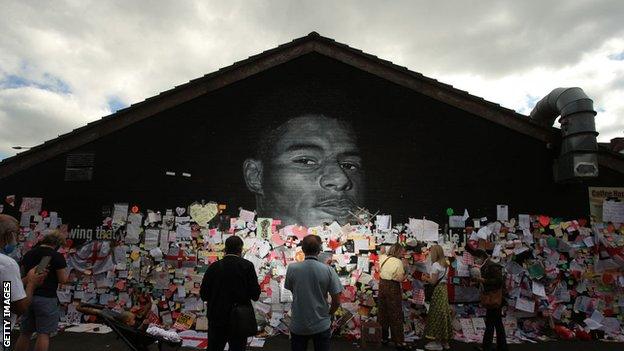Online abuse: Uefa to work with social media platforms in new campaign
- Published

There was an outpouring of support for Marcus Rashford, Jadon Sancho and Bukayo Saka after they received racist abuse online following the Euro 2020 final
Uefa has pledged to work with social media platforms to tackle online abuse as part of a Respect campaign to begin when the women's Euro 2022 starts.
European football's governing body said it would "actively monitor, report and remedy cases of online abuse".
Last summer, England players Marcus Rashford, Jadon Sancho and Bukayo Saka were racially abused online after the men's Euro 2020 final defeat by Italy.
England play Austria at Old Trafford on Wednesday in Euro 2022's opening match.
Uefa said the Respect programme will include a Real Scars campaign which "will highlight the devastating effects of online abuse directed at football players, coaches and officials across social media platforms and educate them on how to best defend themselves against such abuse".
"When you say something on social media, you do not realise how painful it is or the consequences it can have," said France and Lyon defender Wendie Renard.
"It can leave a mark because we are all human, we all have emotions."
Uefa added: "The Respect programme targets concrete actions to prevent abusive online behaviour and discrimination during all of its final competitions, including youth, women's and men's competition final matches for the next three years," said Uefa.
"To ensure that harmful content is removed, Uefa is working directly with major social media platforms such as Twitter, Meta [Instagram and Facebook] and TikTok."

Our coverage of your Premier League club is bigger and better than ever before - follow your team and sign up for notifications in the BBC Sport app to make sure you never miss a moment
